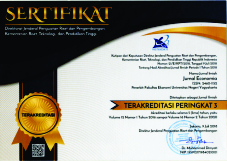The Role of Self-Determination in Linking Humble Leadership to Employee Adaptive Performance
Downloads
Amid the evolving business environment, traditional performance management models have become less relevant, emphasizing the importance of adaptive performance. Adaptive performance is assumed to be influenced by humble leadership, though its impact may depend on employees' perceptions of the leader's motives. This study, using Self-Determination Theory, aims to examine the role of self-determination as a mediator in the relationship between humble leadership and adaptive performance. Data was collected through a 5-point Likert scale questionnaire from 185 private sector employees in Riau, analyzed using SEM PLS. The results show that humble leadership has a positive impact on adaptive performance, both directly and through self-determination as a mediator.
Downloads
Baard, S. K., Rench, T. A., and Kozlowski, S. W. J. (2014). Performance adaptation. J. Manage. 40, 48–99. doi: 10.1177/0149206313488210
Bharanitharan, D. K., Lowe, K. B., Bahmannia, S., Chen, Z. X., and Cui, L. (2021). Seeing is not believing: Leader humility, hypocrisy, and their impact on followers’ behaviors. Leadersh. Q. 32, 101440. doi: 10.1016/j.leaqua.2020.101440
Carpini, J. A., Parker, S. K., and Griffin, M. A. (2017). A look back and a leap forward: A review and synthesis of the individual work performance literature. Acad. Manag. Ann. 11, 825–885. doi: 10.5465/annals.2015.0151
Charbonnier-Voirin, A., El Akremi, A., and Vandenberghe, C. (2010). A multilevel model of transformational leadership and adaptive performance and the moderating role of climate for innovation. Gr. Organ. Manag. 35, 699–726. doi: 10.1177/1059601110390833
Chen, H., Liang, Q., Feng, C., and Zhang, Y. (2021). Why and when do employees become more proactive under humble leaders? The roles of psychological need satisfaction and Chinese traditionality. J. Organ. Chang. Manag. 34, 1076–1095. doi: 10.1108/JOCM-12-2020-0366
Cho, J., Schilpzand, P., Huang, L., and Paterson, T. (2021). How and when humble leadership facilitates employee job performance: The roles of feeling trusted and job autonomy. J. Leadersh. Organ. Stud. 28, 169–184. doi: 10.1177/1548051820979634
Deci, E. L., Connell, J. P., and Ryan, R. M. (1989). Self-determination in a work organization. J. Appl. Psychol. 74, 580–590. doi: 10.1037/0021-9010.74.4.580
Deci, E. L., and Ryan, R. M. (2000). The “What” and “Why” of goal pursuits: Human needs and the self-determination of behavior. Psychol. Inq. 11, 227–268. doi: 10.1207/S15327965PLI1104_01
Fu, H., Ye, B. H., and Xu, X. (2020). The cross-level effect of shared leadership on tourism employee proactive behavior and adaptive performance. Sustainability 12, 6173. doi: 10.3390/su12156173
Griffin, M. A., Neal, A., and Parker, S. K. (2007). A new model of work role performance: positive behavior in uncertain and interdependent contexts. Acad. Manag. J. 50, 327–347. doi: 10.5465/amj.2007.24634438
Jundt, D. K., Shoss, M. K., and Huang, J. L. (2015). Individual adaptive performance in organizations: A review. J. Organ. Behav. 36, S53–S71. doi: 10.1002/job.1955
Kelemen, T. K., Matthews, S. H., Matthews, M. J., and Henry, S. E. (2023). Humble leadership: A review and synthesis of leader expressed humility. J. Organ. Behav. 44, 202–224. doi: 10.1002/job.2608
Liu, H., Jameel Ahmed, S., Anjum, M. A., and Mina, A. (2024). Leader humility and employees’ creative performance: the role of intrinsic motivation and work engagement. Front. Psychol. 15. doi: 10.3389/fpsyg.2024.1278755
Luu, T. T. (2021). Can humble leaders nurture employee well-being? The roles of job crafting and public service motivation. Pers. Rev. 50, 789–811. doi: 10.1108/PR-12-2019-0701
Owens, B. P., and Hekman, D. R. (2012). Modeling how to grow: An inductive examination of humble leader behaviors, contingencies, and outcomes. Acad. Manag. J. 55, 787–818. doi: 10.5465/amj.2010.0441
Owens, B. P., Johnson, M. D., and Mitchell, T. R. (2013). Expressed humility in organizations: Implications for performance, teams, and leadership. Organ. Sci. 24, 1517–1538. doi: 10.1287/orsc.1120.0795
Park, S., and Park, S. (2019). Employee adaptive performance and its antecedents: Review and synthesis. Hum. Resour. Dev. Rev. 18, 294–324. doi: 10.1177/1534484319836315
Qin, X., Yam, K. C., Chen, C., Li, W., and Dong, X. (2021). Talking about COVID-19 is positively associated with team cultural tightness: Implications for team deviance and creativity. J. Appl. Psychol. 106, 530–541. doi: 10.1037/apl0000918
Qurrahtulain, K., Bashir, T., Hussain, I., Ahmed, S., and Nisar, A. (2022). Impact of inclusive leadership on adaptive performance with the mediation of vigor at work and moderation of internal locus of control. J. Public Aff. 22. doi: 10.1002/pa.2380
Rousseau, V., and Aubé, C. (2020). Disentangling the relationship between empowering leader behaviors and adaptive performance in work teams. Gr. Process. Intergr. Relations 23, 761–777. doi: 10.1177/1368430219854801
Ryan, R. M., and Deci, E. L. (2000). Self-determination theory and the facilitation of intrinsic motivation, social development, and well-being. Am. Psychol. 55, 68–78. doi: 10.1037/0003-066X.55.1.68
Sok, K. M., Sok, P., Tsarenko, Y., and Widjaja, J. T. (2021). How and when frontline employees’ resilience drives service-sales ambidexterity: the role of cognitive flexibility and leadership humility. Eur. J. Mark. 55, 2965–2987. doi: 10.1108/EJM-05-2020-0320
Tan, L., Hao, P., Gao, H., and Wojtczuk-Turek, A. (2024). How does paradoxical leadership affect employee adaptive performance? A moderated mediation model. J. Organ. Chang. Manag. doi: 10.1108/JOCM-03-2024-0152
Van den Broeck, A., Vansteenkiste, M., De Witte, H., Soenens, B., and Lens, W. (2010). Capturing autonomy, competence, and relatedness at work: Construction and initial validation of the Work‐related Basic Need Satisfaction scale. J. Occup. Organ. Psychol. 83, 981–1002. doi: 10.1348/096317909X481382
Wang, L. en, Liu, G., Liu, X., Liu, Y., Gao, J., Zhou, B., et al. (2017). The weight of unfinished plate: A survey based characterization of restaurant food waste in Chinese cities. Waste Manag. 66, 3–12. doi: 10.1016/j.wasman.2017.04.007
Ye, B. H., Tung, V. W. S., Li, J. J., and Zhu, H. (2020). Leader humility, team humility and employee creative performance: The moderating roles of task dependence and competitive climate. Tour. Manag. 81, 104170. doi: 10.1016/j.tourman.2020.104170
Zhang, J., Javaid, M., Liao, S., Choi, M., and Kim, H. E. (2024). How and when humble leadership influences employee adaptive performance? The roles of self-determination and employee attributions. Leadersh. Organ. Dev. J. 45, 377–396. doi: 10.1108/LODJ-05-2023-0245
Copyright (c) 2025 Jurnal Economia

This work is licensed under a Creative Commons Attribution 4.0 International License.















